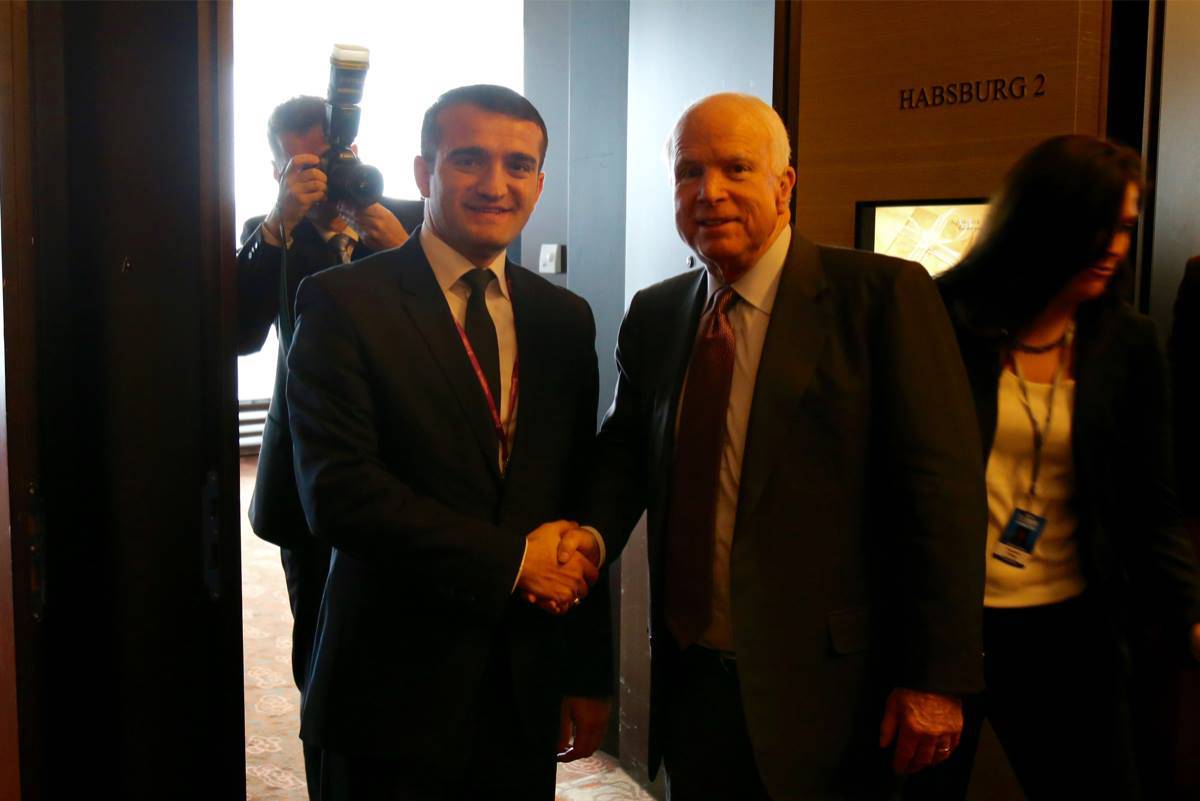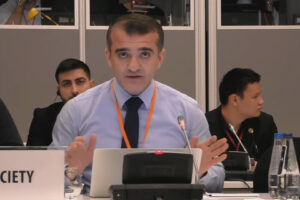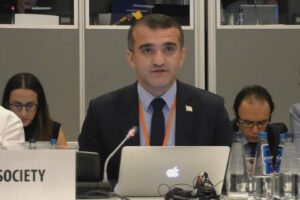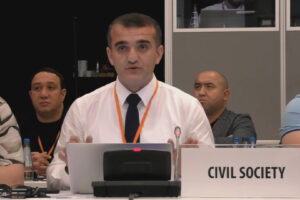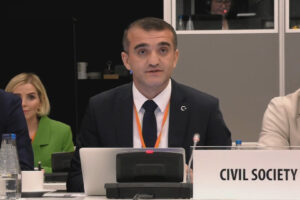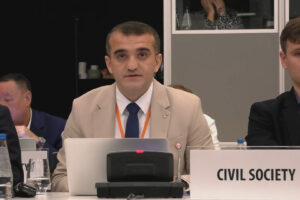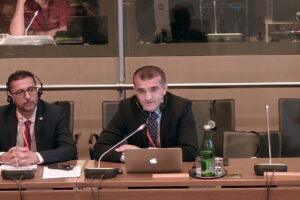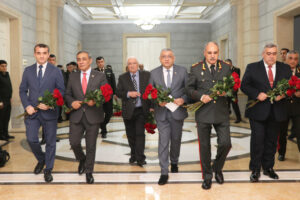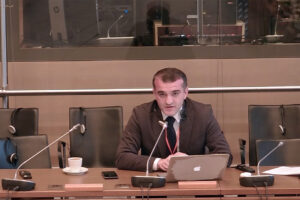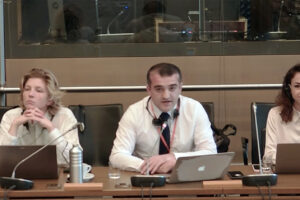Obama, like predecessors, faces tough choices on promoting democracy

 Surrounded by throngs celebrating Poland’s quarter-century of democracy, President Obama on Wednesday pledged not only to defend Eastern Europe against new threats but to support democratic movements throughout the world.
Surrounded by throngs celebrating Poland’s quarter-century of democracy, President Obama on Wednesday pledged not only to defend Eastern Europe against new threats but to support democratic movements throughout the world.
“We stand together because we know that the spirit of Warsaw and Budapest and Prague and Berlin stretches to wherever the longing for freedom stirs in human hearts, whether in Minsk or Caracas, Damascus or Pyongyang,” he said. “And wherever people are willing to do the hard work of building democracy — from Tbilisi to Tunis, from Rangoon to Freetown — they will have a partner in our nations.”
But the truth is far more complicated. Obama, like presidents before him, has made uncomfortable choices in deciding when to promote democracy and when to compromise those principles for other interests. His soaring rhetoric Wednesday also creates expectations that he might find difficult to meet, given his hesitance to use military force and his attention to other pressing issues.
Such tensions are on display this week, which marks the 25th anniversaries of Poland’s first free elections, which the United States supported, and of China’s brutal crackdown on democracy protesters in Tiananmen Square, which the United States largely ignored.
Obama has used diplomacy and, on one occasion, military action to support democratic movements in places as varied as Libya, Burma and Ukraine. But more often, he has decided to work with regimes that are authoritarian (Saudi Arabia and China) or turning that way (Egypt and Russia) because of other U.S. priorities.
“His democracy promotion is a study in schizophrenia — like foreign policy before him,” said Timothy J. Lynch, a University of Melbourne professor who has co-edited a book on U.S. democracy promotion.
“Obama seems to have under-reached,” Larry Diamond, a senior fellow at Stanford University’s Hoover Institution, said in an e-mail. “He clearly cares about democracy, civil society and human rights, and often speaks eloquently about these values. But at a time when these are clearly in retreat around the world, one sees little sense of an overall Obama strategy to renew global democratic progress and counter the efforts of Russia, China and Iran to suppress and subvert democratic movements worldwide.”
Obama’s aides reject the notion they have done anything less than make democracy a fundamental aim of U.S. foreign policy. Ben Rhodes, deputy national security adviser, pointed Wednesday to the ways that administration efforts have borne fruit in places such as Indonesia, Tunisia and Burma.
“We’ve made a democracy a central part of our approach in every region that we operate,” he said, although he acknowledged a lack of progress in Russia, China and Egypt. “We’re going to be very clear when we have differences with those countries, even as we are going to work with them on some issues of mutual interest, whether it’s Iran negotiations or removing Syria’s chemical weapons.”
White House advisers say there is a sound logic to the strategy even if “there is not a unified-field theory of democracy promotion,” in the words of Tom Malinowski, the assistant secretary of state in charge of the Bureau of Democracy, Human Rights and Labor.
Looking back at the democratic movements of a quarter-century ago, Malinowski said there is a bit of revisionism in evaluating the successes and failures of U.S. foreign policy.
“When we look at American foreign policy in hindsight, it looks much more well planned and triumphantly successful than it appears in the moment,” he said. “At the time, people were confused and it wasn’t clear what would turn out well. And that’s how we feel now. It really isn’t very different.”
The problem, Malinowski and others say, is that presidents must make difficult trade-offs because of other priorities, most notably counterterrorism efforts. That’s certainly been the story of U.S. cooperation with authoritarian regimes including Egypt, Jordan, Saudi Arabia, Azerbaijan and others.
Experts inside and outside the administration also point to Russia as an example of the risks of separating democracy and human rights from other priorities.
At the start of his administration — after Russia had invaded the independent nation of Georgia in 2008 — Obama sought to “reset” relations with Russia. But even as Obama worked on improving relations with Moscow, Vladimir Putin and other Russian leaders were increasingly working to curtail democracy and suppress dissent.
“The effort to befriend and engage Russia in this administration was heartfelt and very serious, but it separated the democratic deficit in Russia in a different lane,” a senior administration official said, speaking on the condition of anonymity because he was not authorized to speak to a reporter.
But it is clear in retrospect, this official said, that Putin sees civic dissent, whether within Russia’s borders or in neighboring countries, as a threat to his power.
“People now agree that domestic despotism is related to international aggression,” the official said. “What other reason would Russia offer so much support for Syria?”
Malinowski argued that it was reasonable for Obama to pursue a more diplomatic course early in his term, especially when Russia was technically led by Dmitry Medvedev, the president at the time, rather than Putin, who succeeded him.
“I wouldn’t say our thinking changed,” he said. “Russia has changed.”
In his own words, Obama has sounded more skeptical in recent months about allowing interests to trump ideals in foreign relations. On Tuesday in Warsaw, he said he is wary of “sacrificing principle in pursuit of good relations” with Russia.
“Russia is a significant country with incredibly gifted people, resources, an enormous landmass, and they rightfully play an important role on the world stage and in the region,” Obama said during a Tuesday news conference with the Polish president. “But what we have learned from our history . . . is that basic principles of territorial integrity and sovereignty and freedom, the ability for people to make their own determinations about their country’s future, is the cornerstone of the peace and security.”
Obama, like predecessors, faces tough choices on promoting democracy
 06 June 2014
06 June 2014
 Surrounded by throngs celebrating Poland’s quarter-century of democracy, President Obama on Wednesday pledged not only to defend Eastern Europe against new threats but to support democratic movements throughout the world.
Surrounded by throngs celebrating Poland’s quarter-century of democracy, President Obama on Wednesday pledged not only to defend Eastern Europe against new threats but to support democratic movements throughout the world.
“We stand together because we know that the spirit of Warsaw and Budapest and Prague and Berlin stretches to wherever the longing for freedom stirs in human hearts, whether in Minsk or Caracas, Damascus or Pyongyang,” he said. “And wherever people are willing to do the hard work of building democracy — from Tbilisi to Tunis, from Rangoon to Freetown — they will have a partner in our nations.”
But the truth is far more complicated. Obama, like presidents before him, has made uncomfortable choices in deciding when to promote democracy and when to compromise those principles for other interests. His soaring rhetoric Wednesday also creates expectations that he might find difficult to meet, given his hesitance to use military force and his attention to other pressing issues.
Such tensions are on display this week, which marks the 25th anniversaries of Poland’s first free elections, which the United States supported, and of China’s brutal crackdown on democracy protesters in Tiananmen Square, which the United States largely ignored.
Obama has used diplomacy and, on one occasion, military action to support democratic movements in places as varied as Libya, Burma and Ukraine. But more often, he has decided to work with regimes that are authoritarian (Saudi Arabia and China) or turning that way (Egypt and Russia) because of other U.S. priorities.
“His democracy promotion is a study in schizophrenia — like foreign policy before him,” said Timothy J. Lynch, a University of Melbourne professor who has co-edited a book on U.S. democracy promotion.
“Obama seems to have under-reached,” Larry Diamond, a senior fellow at Stanford University’s Hoover Institution, said in an e-mail. “He clearly cares about democracy, civil society and human rights, and often speaks eloquently about these values. But at a time when these are clearly in retreat around the world, one sees little sense of an overall Obama strategy to renew global democratic progress and counter the efforts of Russia, China and Iran to suppress and subvert democratic movements worldwide.”
Obama’s aides reject the notion they have done anything less than make democracy a fundamental aim of U.S. foreign policy. Ben Rhodes, deputy national security adviser, pointed Wednesday to the ways that administration efforts have borne fruit in places such as Indonesia, Tunisia and Burma.
“We’ve made a democracy a central part of our approach in every region that we operate,” he said, although he acknowledged a lack of progress in Russia, China and Egypt. “We’re going to be very clear when we have differences with those countries, even as we are going to work with them on some issues of mutual interest, whether it’s Iran negotiations or removing Syria’s chemical weapons.”
White House advisers say there is a sound logic to the strategy even if “there is not a unified-field theory of democracy promotion,” in the words of Tom Malinowski, the assistant secretary of state in charge of the Bureau of Democracy, Human Rights and Labor.
Looking back at the democratic movements of a quarter-century ago, Malinowski said there is a bit of revisionism in evaluating the successes and failures of U.S. foreign policy.
“When we look at American foreign policy in hindsight, it looks much more well planned and triumphantly successful than it appears in the moment,” he said. “At the time, people were confused and it wasn’t clear what would turn out well. And that’s how we feel now. It really isn’t very different.”
The problem, Malinowski and others say, is that presidents must make difficult trade-offs because of other priorities, most notably counterterrorism efforts. That’s certainly been the story of U.S. cooperation with authoritarian regimes including Egypt, Jordan, Saudi Arabia, Azerbaijan and others.
Experts inside and outside the administration also point to Russia as an example of the risks of separating democracy and human rights from other priorities.
At the start of his administration — after Russia had invaded the independent nation of Georgia in 2008 — Obama sought to “reset” relations with Russia. But even as Obama worked on improving relations with Moscow, Vladimir Putin and other Russian leaders were increasingly working to curtail democracy and suppress dissent.
“The effort to befriend and engage Russia in this administration was heartfelt and very serious, but it separated the democratic deficit in Russia in a different lane,” a senior administration official said, speaking on the condition of anonymity because he was not authorized to speak to a reporter.
But it is clear in retrospect, this official said, that Putin sees civic dissent, whether within Russia’s borders or in neighboring countries, as a threat to his power.
“People now agree that domestic despotism is related to international aggression,” the official said. “What other reason would Russia offer so much support for Syria?”
Malinowski argued that it was reasonable for Obama to pursue a more diplomatic course early in his term, especially when Russia was technically led by Dmitry Medvedev, the president at the time, rather than Putin, who succeeded him.
“I wouldn’t say our thinking changed,” he said. “Russia has changed.”
In his own words, Obama has sounded more skeptical in recent months about allowing interests to trump ideals in foreign relations. On Tuesday in Warsaw, he said he is wary of “sacrificing principle in pursuit of good relations” with Russia.
“Russia is a significant country with incredibly gifted people, resources, an enormous landmass, and they rightfully play an important role on the world stage and in the region,” Obama said during a Tuesday news conference with the Polish president. “But what we have learned from our history . . . is that basic principles of territorial integrity and sovereignty and freedom, the ability for people to make their own determinations about their country’s future, is the cornerstone of the peace and security.”
 @
@




